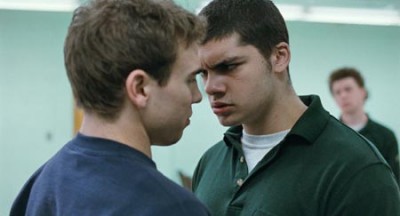| Reviews & Columns |
|
Reviews DVD TV on DVD Blu-ray 4K UHD International DVDs In Theaters Reviews by Studio Video Games Features Collector Series DVDs Easter Egg Database Interviews DVD Talk Radio Feature Articles Columns Anime Talk DVD Savant Horror DVDs The M.O.D. Squad Art House HD Talk Silent DVD
|
DVD Talk Forum |
|
|
| Resources |
|
DVD Price Search Customer Service #'s RCE Info Links |
|
Columns
|
|
|
Dog Pound

Reviewed at the 2010 Tribeca Film Festival
We meet the three juvenile delinquents individually, out in the world, causing trouble. Davis (Shane Kippel), 16, who fancies himself a ladies' man (his introduction is reminiscent of the stomach-churning slobberiness of Larry Clark's Kids), deals pills and coke. Angel (Mateo Morales), 15, is a car thief. And Butch (Adam Butcher), 17, is a hot-tempered fighter who has come to blows with a corrections officer. All three enter Montana's Enola Vale Youth Correctional Center at about the same time. It doesn't go all that well for any of them.
Kim Chapiron's Dog Pound is a film of cutting brutality and searing intensity, a picture that examines the conditions of such a facility, and the boys who inhabit it, with stark, documentary-like precision and attentiveness to detail. In just a few scenes, Chapiron (who co-wrote with Jeremie Deleon) clearly establishes the sheer physical and psychological terror of the place. We come in with Davis, Angel, and Butch, and take it in as they do--the beatings, the violence, the hopelessness.
There's not too much happening plotwise (at least on the surface), and that's for the best--it's functions, for most of its running time, as more a series of sketches, impressions of life on the inside. There is valuable information imparted in the early scenes, but it never feels like exposition; since the three characters function as audience surrogates, they discover the hierarchy of the facility (the trustees in their polo shirts, the general population in their sweats, the solitaries in their orange scrubs), and their daily routine.
They are targeted early, in different ways, by a crew of the so-called "trustees," and the intimidation is scary but believably built. The ringleader is Banks, the low-talking punk who runs the drug trade inside; he's an old-fashioned bully, preying on weakness, playing mind games, and talking with his fists. Butch is singled out by both that crew (for a random beating) and the guards (for not ratting out the perpetrators). He keeps his mouth shut, does his time in solitary, and readies himself for payback. When he unleashes, watch out--it's furious, powerful filmmaking, first exploiting our voyeur-vigilante instincts, and then pushing them to the absolute limit, and rubbing our nose in them a bit.
The performances (many of them from non-actors) are electrifying. In what amounts to the leading role, Butcher has the fearless intensity of a young Sean Penn; he won't let you see behind his oblique eyes, and when he finally does, you're not sure you want to. The slow boil of his work, particularly during his slow rise to power (a turn of events that favorably calls to mind several of the best scenes of A Prophet), is palpable and somewhat disquieting--he's got this guy down cold. Davis can't put on the tough front like Butch can, and Kippel hints at the character's vulnerability and fear without pandering. Morales doesn't get as much to do as the other two, but there are several splendid supporting performances--Slim Twig as "Max," a wry jokester with a chip on his shoulder, and Lawrence Bayne as Goodyear, their primary corrections officer, pulls off the tricky maneuver of playing him as neither a hardass nor a good-hearted pushover. He's somewhere in between, just doing his job.
The film's occasional dips into low comedy are hit and miss; the "guy talk" back-and-forth is an authentic release valve (and a pretty accurate representation of the braggart machismo of male teen sexuality), but the flashback to one of Davis's (presumably fictitious) sexcapades is a miscalculation. And the introduction of a third act clock (a bit of legal wrangling could mean only two more weeks inside for Butch) feels like an arbitrary attempt to impose a structure on a film that's been humming along just fine without one. What it adds up to, when the violence and brutality comes to a punishing head at the end, is an accumulation of incidents. Nothing in Dog Pound feels placed for plot, but it's all there for a reason--it's all pushing the picture towards the body blows of the climax.
But as badly shaken as those closing scenes leave the viewer, they're not the images that have stuck with me. There is the image of the inmates in a physical education class, playing dodgeball (sounds like a splendid idea, right?), throwing themselves into the game with a reckless, bad-boy abandon that recalls Vigo's Zero for Conduct. There is the look on Davis' face as he steals back his $100 mall boots. But most of all, there is the sense of helplessness in the sequence, late in the film, when Davis keeps buzzing the guards over the intercom for one reason: he's hurt, and he wants to call his mom. The subtext here isn't subtle, but it socks you in the jaw. For all their swagger, for all their posturing, these are not men. They're boys. Little boys.
Jason lives in New York. He holds an MA in Cultural Reporting and Criticism from NYU.
|
| Popular Reviews |
| Sponsored Links |
|
|
| Sponsored Links |
|
|
| Release List | Reviews | Shop | Newsletter | Forum | DVD Giveaways | Blu-Ray | Advertise |
|
Copyright 2024 DVDTalk.com All Rights Reserved. Legal Info, Privacy Policy, Terms of Use,
Manage Preferences,
Your Privacy Choices | |||||||











